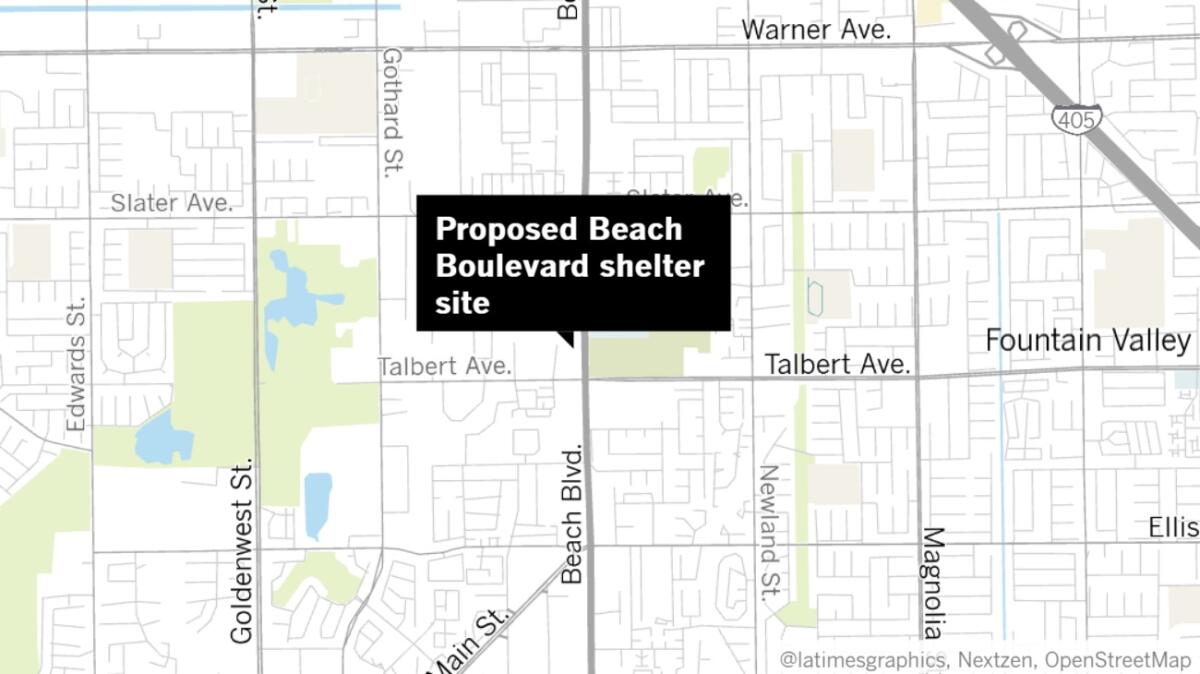H.B. to explore more sites for possible homeless shelter and may consider regional option

In its continuing search for a place to shelter local homeless people, the Huntington Beach City Council voted Monday night to direct city staff to explore more site options after the location eyed most recently was put on hold and as the city also considers a pivot toward a more regional solution.
The 6-0 decision, with Councilwoman Kim Carr absent, came after previous potential shelter locations fell through.
City Manager Oliver Chi said last week that additional options for shelter locations have become available and therefore he wasn’t ready to recommend that the council move forward with the former site of Al’s Woodcraft at 17881 Beach Blvd. for a 35- to 60-bed homeless shelter. He declined to say where other possible sites are.
An item was struck from the council agenda that would authorize Chi to move forward with documentation required for the sale of 15311 Pipeline Lane, for which the council authorized a $2.85-million purchase in April. The Pipeline property was earmarked for a 75- to 90-bed shelter, but the city was later sued by a group of residents, other property owners and businesses because they claimed the site could be used only for industrial purposes.
The legal matter involving the Pipeline site is continuing.
Also in April, the city scrapped a plan to create a 50-bed shelter at 5770 Research Drive, just behind Marina High School, after objections from residents, school officials and parents.
Another option, at 17712 Crabb Lane, came off the table after the property owner was no longer willing to consider its use as a temporary shelter, Chi said.
Chi also said last week that regional navigation centers (homeless shelters) may be the next focus for consideration, given the obstacles to identifying a viable location in Huntington Beach.
During a council study session Monday, Chi discussed funding for homelessness solutions made available by the state Building Homes and Jobs Act of 2017, which established a $75 recording fee on all real estate document transactions.
Funds from the law, also known as Senate Bill 2, are designated to “offset housing and homelessness-related response costs,” Chi said, and are parceled into Year 1 planning grants and Permanent Local Housing Allocation money available afterward. PLHA funds can support shelter management or development and preservation of permanent and transitional housing.
Chi said Huntington Beach may qualify for $625,000 in Year 1 planning grants and $481,000 in PLHA grants for the second year.
Over five years, the city would be able to get up to $3.65 million in PLHA funding, though the amount available is susceptible to fluctuation depending on the number of real estate transactions year to year.
“The bottom line is, this is all state money that every jurisdiction has paid into through real estate transactions, and that funding should be getting back to communities so we can addresses our issues,” Chi said.
“We need to make sure if somebody wants help ... they have the help available,” Chi added. “But in order to make sure we don’t continue to see an erosion in the quality of life, we need to be able to enforce our local rules and regulations, especially as jurisdictions around us start creating navigation centers [shelters] so they can start enforcing their rules.”
According to a 2017 ruling by the U.S. 9th Circuit Court of Appeals, it’s unconstitutional to prosecute homeless people for sleeping on public property when they don’t have access to shelter. Until cities like Huntington Beach provide a shelter, they can’t enforce their anti-camping ordinances.
Councilman Mike Posey said it is imperative to capture the money and invest in local solutions.
All the latest on Orange County from Orange County.
Get our free TimesOC newsletter.
You may occasionally receive promotional content from the Daily Pilot.




